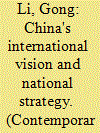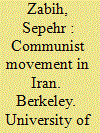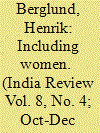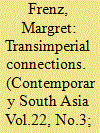|
|
|
Sort Order |
|
|
|
Items / Page
|
|
|
|
|
|
|
| Srl | Item |
| 1 |
ID:
133853


|
|
|
|
|
| Publication |
2014.
|
| Summary/Abstract |
The global order was set in place following the end of the Second World War by a consortium of western countries headed by the U. S. since then, major western countries have strived to maintain their long dominance in global politics and economics. With the rise of nationalist movements, former colonies gained their independence, and many developing countries joined the UN in recent years the economies of the emerging powers have grow rapidly and they have also joined WTO.
|
|
|
|
|
|
|
|
|
|
|
|
|
|
|
|
| 2 |
ID:
029794


|
|
|
|
|
| Publication |
Berkeley, University of California Press, 1966.
|
| Description |
x, 279p.hbk
|
|
|
|
|
|
|
|
|
|
|
|
Copies: C:1/I:0,R:0,Q:0
Circulation
| Accession# | Call# | Current Location | Status | Policy | Location |
| 000607 | 955.05/ZAB 000607 | Main | On Shelf | General | |
|
|
|
|
| 3 |
ID:
092894


|
|
|
| 4 |
ID:
101438


|
|
|
|
|
| Publication |
2010.
|
| Summary/Abstract |
This article analyzes the electoral performance of the nationalist movement in Corsica. First, we ran an ecological analysis of a new dataset, including observations from all Corsican towns for all regional elections from 1992 to 2004. Second, we complemented the ecological findings with individual-level data. Our results show that the classical combination of economic-based and identity factors that account well for nationalist voting is conditioned in the Corsican case by the existence of two specific phenomena: the tendency of the nationalist movement to experience internal divisions and party splitting, and the extraordinary electoral resilience of local notables, the traditional French-loyal political leaders on the island.
|
|
|
|
|
|
|
|
|
|
|
|
|
|
|
|
| 5 |
ID:
140795


|
|
|
|
|
| Publication |
s.l., s.n., 19??.
|
| Description |
21p.pbk
|
|
|
|
|
|
|
|
|
|
|
|
Copies: C:1/I:0,R:0,Q:0
Circulation
| Accession# | Call# | Current Location | Status | Policy | Location |
| 007548 | 966.9/NIG 007548 | Main | On Shelf | General | |
|
|
|
|
| 6 |
ID:
133097


|
|
|
|
|
| Publication |
2014.
|
| Summary/Abstract |
Throughout 2011, events celebrating, debating and criticizing the 50 years of Goa's existence within the Indian Union took place across Goa. These debates oscillated between the poles of perceiving what happened on the 19 December 1961 as either 'liberation' or 'occupation', reflecting the broad spectrum of perspectives at the time. Missing from these discussions were the views of Goans beyond Goa, across the Indian Ocean in East Africa and further afield. Even when divided by the Indian Ocean from life in Goa, they retained an interest in their country of origin. This paper uses archival and oral history sources to contextualize and understand East African Goans' responses, to address this gap in the literature, to problematize some existing accounts of the events and to draw attention to the significance of transimperial connections across the Indian Ocean. I argue that the lack of active involvement in political developments by the majority of Goans - whether they were in Goa or in East Africa - was intimately linked to the anxiety many of them felt about what the creation of nation-states in both the Indian subcontinent and East Africa would mean in practical terms for individuals' lives 'on the ground'
|
|
|
|
|
|
|
|
|
|
|
|
|
|
|
|
| 7 |
ID:
109085


|
|
|
|
|
| Publication |
2011.
|
| Summary/Abstract |
This article examines the role and importance of charisma in Tunku Abdul Rahman's leadership of the nationalist movement in Malaya in the 1950s. A Cambridge University-educated prince from the northern state of Kedah, the Tunku turned a disparate group of communal political parties into a potent nationalist movement, the Alliance Party, which secured independence from Britain within five years of its formation. Previous studies have focused largely on his political leadership of the movement and have not examined the element of the Tunku's charisma in the nationalists' campaign. This article examines the political charisma of this leader in the context of recent theories of charisma. Historical evidence indicates that his personal appeal or charisma significantly influenced support for the Tunku's leadership of the nationalist movement, and, at a certain stage, he had almost a cult following. Some of the Tunku's strategies and actions were highly risky and even bordered on the irrational; yet, they were fully embraced by his supporters. The phenomenon of charisma is useful in attempting to understand political galvanisation, such as that instigated by the Tunku, in a way that other theories of political mobilisation (such as legal-rational or traditional leadership) cannot. Drawing on a wide range of primary sources such as the Alliance Party documents and records of the Colonial Office, this article explores the Tunku's charisma as an explanatory factor in the rise of the nationalist movement in Malaya in the 1950s.
|
|
|
|
|
|
|
|
|
|
|
|
|
|
|
|
| 8 |
ID:
041883


|
|
|
|
|
| Edition |
1st edn.
|
| Publication |
Calcutta, N.A., 1984.
|
| Description |
xvi, 231p.hbk
|
|
|
|
|
|
|
|
|
|
|
|
Copies: C:1/I:0,R:0,Q:0
Circulation
| Accession# | Call# | Current Location | Status | Policy | Location |
| 024997 | 954.104/CHA 024997 | Main | On Shelf | General | |
|
|
|
|
| 9 |
ID:
119474


|
|
|
|
|
| Publication |
2013.
|
| Summary/Abstract |
â??B oth P alestinian nationalism and Z ionism, as concepts, embody the same principle; namely both are nationalist movements based on the requirement of a homeland for their own people.â? 1 The critical problem, however, seems to be that both have been claiming the same piece of land for their homelands, and thus the source of trouble is more practical than ideological. Contrary to the assumption hidden in this articleâ??s given title, political ideologies do not recognize nor reconcile with each other, nor do they determine who recognizes whom and who reconcile with whom. It is only individuals, and sometimes also collectives, whoâ??metaphorically speakingâ??initiate or undergo such modifications of relationship. Individuals tend to justify changes in their personal relations by terms that are either emotional ( e.g., fallen in love with her, cannot stand him anymore) or based on moral-normative grounds ( e.g., he behaved decently, she promised, yet . . .). Collectives, on the other hand, often rely on political ideologies as their justificationâ??or excuseâ??for moving from one state of relations with another collective to a different state. Yet, as the dominant Political Realist school argues, particularly, although not only, on the collective/national level, inter-relations are first and foremost determined by needs and interests of the actors. Ideologies are just the legitimizing hooks to hang on, not the genuine source of or the motivation for such a change.
|
|
|
|
|
|
|
|
|
|
|
|
|
|
|
|
|
|
|
|
|